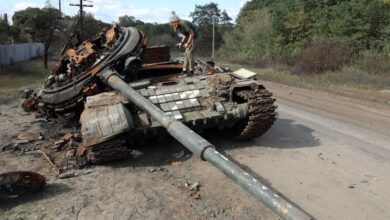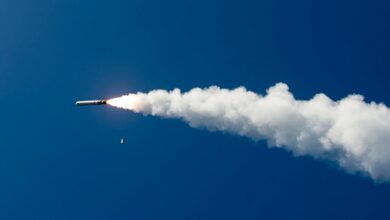President Emmanuel Macron faces a major challenge to retain France’s influence over resolving the Nagorno Karabakh conflict, needing to take account of the large Armenian minority in his country and accused by Azerbaijan of bias.
Macron has expressed discomfort over the Russia-brokered ceasefire this month that ended weeks of fighting between Azerbaijan and Armenia and allowed Baku to consolidate significant military gains.
France is, along with Russia and the United States, the co-chair of the Minsk Group of countries that for almost three decades have sought agreement on the status of Nagorno Karabakh, an Armenian-populated region of Azerbaijan which broke away from Baku in a war as the USSR collapsed.
“We don’t consider this ceasefire to be sufficient,” Macron said in a meeting with French Armenians at the weekend. “It does not solve the political question and all the other issues,” he added.
Macron was a vocal critic of the military offensive launched by Baku in late September to regain control of Karabakh and in particular the backing of NATO member Turkey, which he accused of despatching Syrian jihadists to fight for Azerbaijan.
He insisted that the resolution of the conflict should not be left to Russia and Turkey — which has backed the ceasefire and wants its troops deployed in Azerbaijan — saying it must remain in the hands of the Minsk Group.
“There is a whole load of issues that cannot just be settled in a purely Turkish-Russian discussion,” said Macron.
‘Minsk Group Dead’
But with Yerevan defeated militarily and Prime Minister Nikol Pashinyan forced to accept the unfavorable terms of the deal overseen by Russian President Vladimir Putin, France is on the receiving end of a backlash.
While Paris insisted it remained neutral in the conflict, calls have grown for it to surrender its position on the Minsk Group, a deeply unpalatable suggestion as France seeks to bolster its own international profile.
The situation has not been helped by a purely symbolic resolution passed on Wednesday by France’s upper house Senate — controlled by right-wing opponents of Macron — recognizing Nagorno Karabakh as independent, a step never taken even by Yerevan.

“The Minsk Group, as it was created, is dead. Whether we like it or not, Vladimir Putin played a masterful game and the Turks also scored,” said Didier Billion, deputy director at the French Institute for International and Strategic Affairs (IRIS).
He told AFP that France now finds itself “out of the game” after “taking up the cause” for Armenia, even though its status as mediator meant it was officially neutral.
France’s Armenian community is around 600,000 strong and also well represented in the higher echelons of politics.
‘Reconsider’
The French foreign ministry emphasized in a statement that the recognition of Karabakh by the Senate did not reflect French policy.
But Baku summoned the French ambassador while Azerbaijani MPs adopted a resolution calling for Paris to be expelled from the Minsk Group.
Some analysts have suggested it would be useful if France bowed out of its role, especially given its dire relations with Azerbaijan’s ally Turkey.
“France should seriously consider renouncing its co-chair position in favor of another European country or an EU-wide position,” said Thomas de Waal.
“It has held the position for 23 years, and a country like Germany or Sweden — having more balanced relations with Armenia and Azerbaijan — would almost certainly be able to deliver more.”
For now, France is seeking to use soft power, sending aid to Armenia with the second flight of humanitarian aid due to land on Friday after a first consignment arrived last Sunday.
Macron will also be hoping that its fellow Minsk Group chair the United States will show more interest in the issue under incoming president Joe Biden than under Donald Trump.
And analysts agree that while the ceasefire is holding, it has not solved the problem of Nagorno Karabakh’s long term status.
Describing the deal as a “bitter pill for Armenia,” analysts at the International Crisis Group (ICG) said: “Humiliation cannot be a strong basis for sustained peace.”












